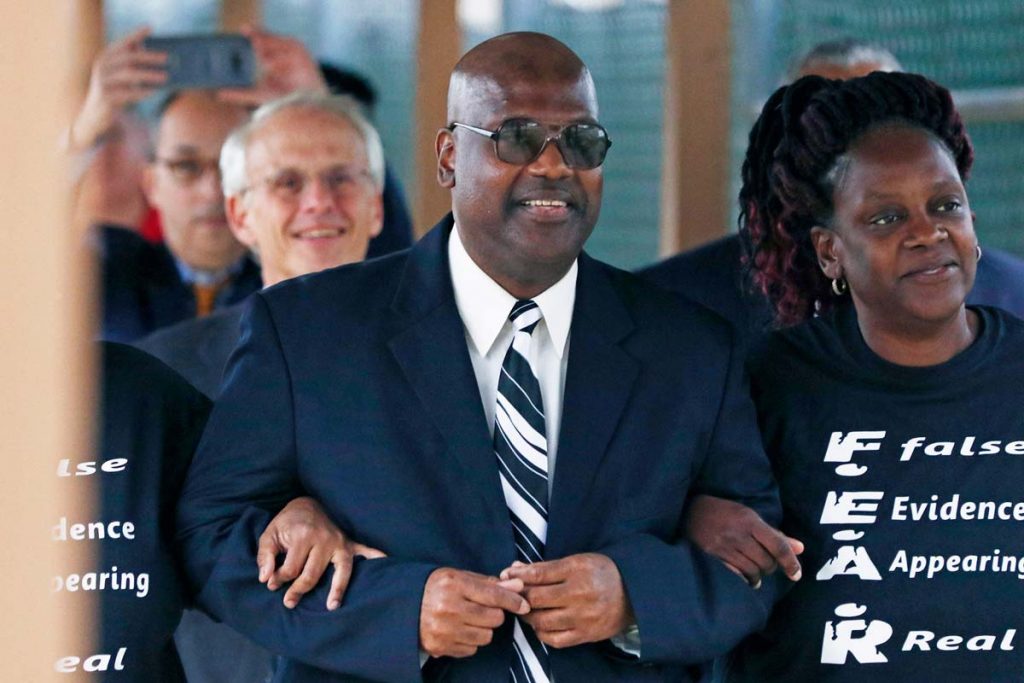Sidebar
Curtis Flowers

Curtis Flowers and his sister, Priscilla Ward, leaving the Winston Choctaw Regional Correctional Facility in Louisville, Mississippi, in December 2019.
Rogelio V. Solis/AP
Curtis Flowers, who is African American, was convicted of the murder of four employees at a furniture store in Winona, Mississippi, and spent nearly 24 years in solitary confinement on death row at Mississippi’s Parchman Prison.1 Parker Yesko, “It’s Over: Charges Against Curtis Flowers Are Dropped,” American Public Media Reports, Sept. 4, 2020; Nicholas Bogel-Burroughs, “After 6 Murder Trials and Nearly 24 Years, Charges Dropped Against Curtis Flowers,” New York Times, Sept. 4, 2020.
The State’s case against Mr. Flowers was entirely circumstantial, largely based on testimony regarding his whereabouts on the morning of the murders and alleged confessions he made to jailhouse informants that were later recanted.2 Yesko, “It’s Over”; Bogel-Burroughs, “Charges Dropped Against Curtis Flowers.” Many of the witnesses were threatened with jail or promised leniency in exchange for their testimony.3 Parker Yesko, “What Exactly Are Prosecutors Allowed To Do?” American Public Media Reports, May 15, 2018; Parker Yesko, “Clemmie Fleming Becomes Second Major Witness to Recant in Curtis Flowers Case,” American Public Media Reports, July 2, 2019; Associated Press, “What’s Next for Curtis Flowers? New Mississippi AG Reviewing 6-Trial Murder Case,” Clarion Ledger, Feb. 10, 2020.
In his relentless pursuit of a death sentence for Curtis Flowers, district attorney Doug Evans—elected in 1991 and re-elected to his eighth term in 2019—repeatedly violated Batson by removing nearly all of the Black jurors at each of the six trials that occurred over the course of 23 years.4 Parker Yesko, “The Rise and Reign of Doug Evans,” American Public Media Reports, June 12, 2018; Parker Yesko, “Judge Dismisses Lawsuit Against DA Doug Evans,” American Public Media Reports, Sept. 11, 2020; Alissa Zhu, “Curtis Flowers: What You Need to Know About the Winona Furniture Store Quadruple Homicides,” Clarion Ledger, March 18, 2019.
As the Supreme Court put it: “The State’s relentless, determined effort to rid the jury of black individuals strongly suggests that the State wanted to try Flowers before a jury with as few black jurors as possible, and ideally before an all-white jury.”5 Flowers v. Mississippi, 139 S. Ct. 2228, 2246 (2019).
At the first trial in 1997, Mr. Evans removed every Black juror. An all-white jury convicted Mr. Flowers and sentenced him to death. The Mississippi Supreme Court overturned the conviction based on numerous instances of prosecutorial misconduct, including reliance on evidence not introduced at trial.6 Flowers, 139 S. Ct. at 2236.
At the second trial in 1999, Mr. Evans again used his peremptory strikes to remove all five qualified Black jurors. Although the trial judge found that Mr. Evans had violated Batson, the judge simply returned one of the struck Black jurors to the jury, and the jury of 11 white people and one Black person convicted Mr. Flowers and sentenced him to death.7 Flowers, 139 S. Ct. at 2236. Again, the Mississippi Supreme Court overturned the conviction due to the prosecutor’s misconduct.8 Flowers, 139 S. Ct. at 2236.
At the third trial in 2004, Mr. Evans used all 15 of his strikes against Black prospective jurors; the lone Black juror on the otherwise all-white jury was seated after the State ran out of peremptory strikes.9 Flowers, 139 S. Ct. at 2236. In finding a Batson violation, the Mississippi Supreme Court recognized that the case presented “as strong a prima facie case of racial discrimination as we have ever seen in the context of a Batson challenge.”10 Flowers v. State, 947 So.2d 910, 935-936 (Miss. 2007).
The fourth trial took place in 2007, and once again, Mr. Evans used all 11 peremptory strikes against Black jurors but did not have enough strikes to remove all of the Black prospective jurors.11 Flowers, 139 S. Ct. at 2237. The jury of seven white jurors and five Black jurors could not reach a unanimous verdict, and a mistrial was declared.12 Flowers, 139 S. Ct. at 2237.
At the fifth trial in 2008, a jury of nine white jurors and three Black jurors could not reach a unanimous verdict, resulting in a second mistrial.13 Flowers, 139 S. Ct. at 2237. Remarkably, the hold-out juror, who was Black, was arrested and charged with perjury for purportedly lying during jury selection, although the charges were later dropped.14 Lacey McLaughlin, “Majority White Jury in Flowers Trial,” Jackson Free Press, June 11, 2010.
In the sixth and final trial, Mr. Evans used five of his six peremptory strikes against Black prospective jurors, leaving one Black juror and 11 white jurors.15 Flowers, 139 S. Ct. at 2237. The Supreme Court found that Mr. Evans had violated Batson, noting that over the course of six trials, he struck 41 of the 42 qualified Black prospective jurors. He “appeared to proceed as if Batson had never been decided,” the Court observed.16 Flowers, 139 S. Ct. at 2246.
Only after this sixth reversal did the State drop its case against Mr. Flowers, who has always maintained his innocence. He was released from prison in 2020.17 Bogel-Burroughs, “Charges Dropped Against Curtis Flowers.”